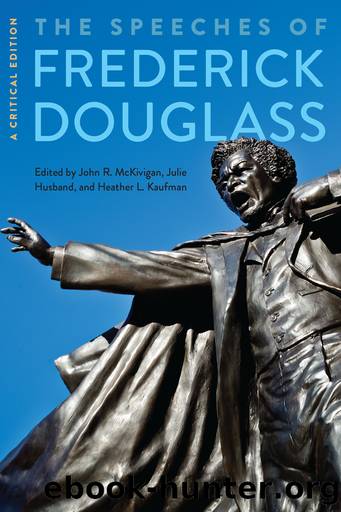The Speeches of Frederick Douglass by Frederick Douglass

Author:Frederick Douglass [Mckivigan, John R.]
Language: eng
Format: epub
Publisher: Yale University Press
Published: 2018-10-15T00:00:00+00:00
âWhich Greeley Are We Voting For?â
An Address Delivered in Richmond, Virginia, 24 July 1872
Unidentified newspaper clipping, âCampaign of 1872,â 6:82â84, Box 95, Edward McPherson Papers, Library of Congress.
Although never an abolitionist, Horace Greeley had vigorously opposed the western expansion of slavery and championed the Republican party through his editorials in the New York Tribune, the newspaper with the nationâs largest circulation. Thus, when Greeley challenged Ulysses S. Grant in the 1872 presidential election, running on the Liberal Republican ticket, it was a serious threat to the Radical Republicansâ Reconstruction program. As a Republican party stalwart, Frederick Douglass campaigned for Grant and opposed Greeleyâs rhetoric of conciliation between North and South, which entailed federal military withdrawal from the South and the abandonment of African American rights.
When the Democratic party met for its convention in Baltimore, it also nominated Greeley for president, despite his long history of attacking it, in hopes of regaining national political power. The chair of the Democratic National Committee, August Belmont, endorsed Greeley, albeit reluctantly, because he was one of the âwisest and best men of the Republican partyâ who had âsevered themselves from the Radical wingâ of the Republicans.1
Subsequent editorials in the Richmond Daily Dispatch, a Democratic party newspaper, put forth a âLost Causeâ rationale for defeating President Grant, which meant removing federal protections for African American rights in the South: âThe key note of the Administration is that the continued repression of the South is necessary to the safety of the republic. The key note of the Democratic-Republican or Liberal party is that the sections must shake hands across the bloody chasm.â2
With these accusations as a backdrop, the Republican party sponsored a rally in Richmond, on 24 July, and Frederick Douglass addressed the crowd. Several âwell-known Republicansâ joined Douglass on the platform, and he was the first speaker to address the gathering. The Richmond Daily Dispatch described Douglassâs appearance in detail and then opined, âHe spoke with ease and fluency, his gestures were appropriate, and his language well-chosen, but as an orator he does not excel several well known colored men in Virginia who were slaves until freed by the sword.â After this implicit criticism of Douglassâs courageous escape from slavery, the paper remarked that âhis speech created less enthusiasm than might have been expected.â
The summary of Douglassâs speech in the Daily Dispatch downplayed the irony in his speech. For example, Douglass jokes, âI hear from several sources that all the intelligent colored people of the South are going to vote for Horace Greeley and B. Gratz Brown. (Loud cries of âNo!â) Well, I hope you wonât have many such intelligent ones in Virginia. (Applause and laughter.)â The Daily Dispatch reported the latter sentence as: âIf that was so, he hoped and believed there were very few intelligent colored people in Virginia. (Applause.)â Senator Henry Wilson, the Republicansâ vice presidential candidate, and several other speakers followed Douglass, and the event ended at dusk, when the crowd was supplied with Chinese lanterns for a procession that âpresented a brilliant spectacle.
Download
This site does not store any files on its server. We only index and link to content provided by other sites. Please contact the content providers to delete copyright contents if any and email us, we'll remove relevant links or contents immediately.
| Afghan & Iraq Wars | American Civil War |
| American Revolution | Vietnam War |
| World War I | World War II |
Waking Up in Heaven: A True Story of Brokenness, Heaven, and Life Again by McVea Crystal & Tresniowski Alex(37784)
Empire of the Sikhs by Patwant Singh(23072)
We're Going to Need More Wine by Gabrielle Union(19034)
Hans Sturm: A Soldier's Odyssey on the Eastern Front by Gordon Williamson(18571)
Leonardo da Vinci by Walter Isaacson(13315)
The Radium Girls by Kate Moore(12017)
Tools of Titans by Timothy Ferriss(8363)
Educated by Tara Westover(8045)
How to Be a Bawse: A Guide to Conquering Life by Lilly Singh(7471)
Permanent Record by Edward Snowden(5838)
The Last Black Unicorn by Tiffany Haddish(5629)
The Rise and Fall of Senator Joe McCarthy by James Cross Giblin(5269)
Promise Me, Dad by Joe Biden(5141)
The Wind in My Hair by Masih Alinejad(5091)
A Higher Loyalty: Truth, Lies, and Leadership by James Comey(4951)
The Crown by Robert Lacey(4806)
The Iron Duke by The Iron Duke(4349)
Joan of Arc by Mary Gordon(4099)
Stalin by Stephen Kotkin(3956)
